 |
TIME DILATION |  |
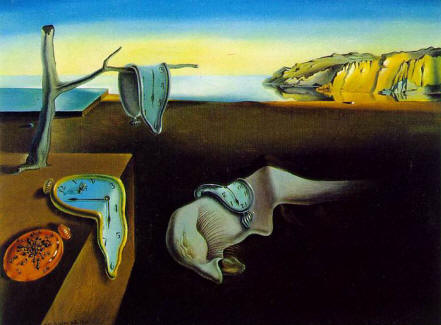
Time Dilation is a subject that has fascinated me for years.
For those not familiar with it, it can be a real mind bender to grasp. But once understood, it changes our understanding of the world around us.
This page is written in a scientific light, but for those not familiar with the predictions of Einstein's Relativity, I urge you to read on and not be put off by the science. I promise to keep this article simple enough that no previous understanding of the topic is required - only a little logical thought.
I would like to firstly explain what time dilation is and then by means of two simple thought experiments, show how Einstein came to this realisation.
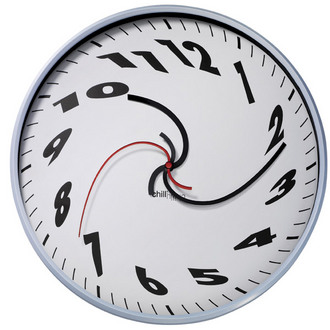
What Is Time Dilation?
In a nutshell, time dilation refers to the fact that time is not constant. To explain:
When Isaac Newton (1643 - 1727) developed his laws of motion which we today learn about in high school science, he worked on the assumption that time was a universal constant. Unchanging wherever you are and whatever you are doing.
That meaning two people with accurate clocks will always agree on the time wherever they are, whatever they are doing.
The clocks will always be synchronised.
This assumption worked well for over 200 years. Scientists used these equations for everything from building engines and bridges to predicting the paths of the planets as they travel around the sun. But as technology advanced and scientific measurements became more accurate, it was found that there were small errors in the predictions made by Newton's laws. For example, the prediction of the path of the planet Mercury was found to be slightly incorrect.
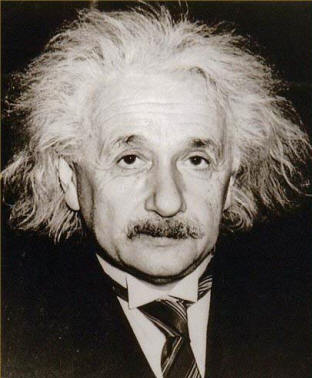
Enter Albert Einstein. In the early 1900's Einstein proposed his radical theory of Relativity.
This theory made accurate predictions where Newton's laws had failed. Einstein's theory of General Relativity has changed our lives in ways that few realise. It has given us modern wonders stretching from the micro computer revolution to modern day space travel. However for the purpose of this article, we will limit ourselves to time dilation.
One of the primary concepts introduced by relativity is the fact that time is not constant.
Two people in different places, moving at different speeds will not experience the passing of time at the same rate.
Assume you and your identical twin have clocks that are extremely accurate and are synchronised with each other.
If you left the two clocks sitting together on a shelf and came back at a later time, you would find that the clocks are still in agreement. They are still synchronised.
Now your twin, who is identical to you in age, takes his clock and goes on a journey. He travels at high speed and at high altitude and then after some time returns to you. You now compare your clocks and you will find that they are no longer in agreement. Your twins clock will be further ahead than yours. His will tell a later time.
So has the clock been damaged. No. It has experienced time dilation. Not only is his clock ahead of yours, but he is now older than you by that same length of time. He has lived that length of time longer than you. The time he experienced was longer than the time you experienced.
In reality the time difference would be so small that only the most accurate clocks in the world would be able to detect it.
But the principle is there. Time is not constant.
Knowing that, one might dismiss the whole principle as only being good for academic interest, but the truth of the matter is brought home when one considers the fact that modern passenger aeroplanes have to factor time dilation into their navigation equipment or they will be kilometres away from the point that the control tower on the ground believes them to be.
Furthermore, the little GPS that you carry in your pocket when you go hiking or stick to your windscreen when driving is also totally reliant on time dilation.
If the GPS satellites did not factor in time dilation, your Garmin on your windscreen would tell you that you are kilometres away from where you actually are.
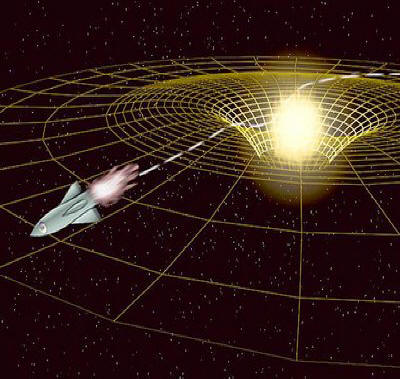
So what causes time dilation? Due to curves created in Einstein's Space-Time two factors influence time dilation. The speed you are travelling as well as your distance from a large gravitational object such as the sun or a planet. In short, the faster you are travelling the slower time moves and the closer you are to a large source of gravity, the slower time moves.
Time dilation experienced on earth is very small. So small that only the most accurate clocks can detect it, but as we head to the extremes of speed and gravity things look a little different.
Should your twin get into a spaceship and travel near the speed of light for one day and then return to Earth, he will be one day older.
You on the other hand will have lived out your life and watched your children give birth to their children. Generations will have been born and died and your twin will return to find everyone he knew to be long dead.
What was 24 hours to him was hundreds of years back on Earth.
That is time dilation and it is no longer just a scientific theory. It has been proven over decades in many different scientific disciplines and is now part of your everyday life.
Understanding Time Dilation
Einstein, through relentless logical thought developed a mathematical masterpiece which at the time was so advanced that it was only understood by himself and three other leading scientists of the time. Now these equations are taught to first year university students studying physics. The principles contained in General Relativity that relate to time dilation can however be understood by people not trained in any manner of physics.
Please join me in two simple thought experiments that show us quite simply how Einstein realised that time cannot be constant.
Firstly Einstein's principle of Equivalence which is the predecessor to Relativity.
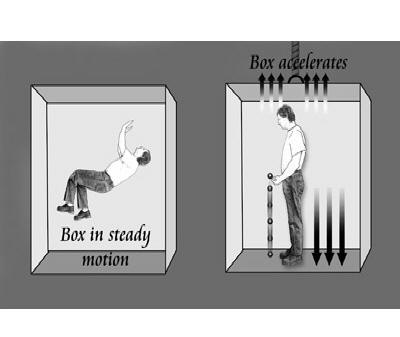
Assume that you are floating in space inside a box. As with any astronaut in space, you have no weight. You are simply floating in the box, there is no up and no down.
Now the box begins to accelerate in one direction. Note the box is not experiencing a constant speed, but a constant acceleration. That is it is continuously speeding up. You suddenly feel weight as you are pressed against one side of the box. To you this becomes the floor. You can now stand on that "floor" and the concepts of up and down make sense to you. If you dropped an apple it would fall to the floor.
To you inside the box, you would be unable to tell if you where in space constantly accelerating or simply stationery on the surface of the Earth under the effect of gravity.
Seeing this we can understand that while inside the box the laws of physics affecting you are no different whether you are being rocketed through space at a constant acceleration or simply standing in a box on the Earths surface. To you it is one and the same thing.
Simply put, that is the principle of equivalence.
Secondly Einstein's principle of Time Dilation.
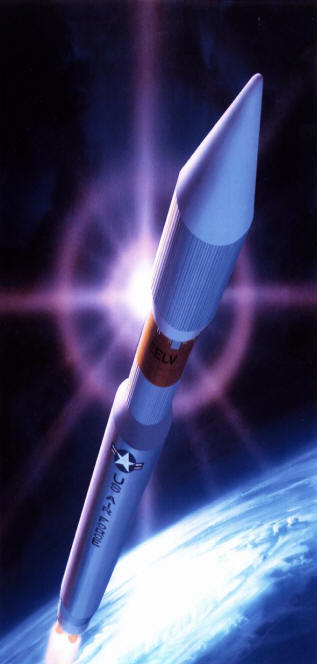
Assume that you and your twin are in space in a long rocket which is stationery.
He goes to the front of the rocket and you go to the back.
You both have your clocks with you.
Your twin at the front of the rocket must shoot a beam of light down the length of the rocket to you at the bottom exactly every second.
He fires his first beam which reaches you. One second later he fires his second beam which you also receive.
After checking your clock you will see that the just as with your twin, the beams of light are separated by exactly one second.
Now your rocket begins to thrust you forward at a constant acceleration, just like the box before.
Your twin fires another beam of light at you. The time it takes for the beam to reach you is a little bit shorter because you are now moving towards the beam as it moves towards you. The rocket is pushing you towards the beam making the distance that the light must travel to reach you a little shorter.
He now fires the second beam. You are now travelling even faster than before, so the distance that the beam of light has to travel is even shorter than before. Thus, from your point of view, the second beam has reached you in less than one second.
Again your twin fires another beam as his clock reaches its next second. You are now travelling a little faster than before due to the rockets constant acceleration and therefore reduce the distance the light must travel even more. Again to you it appears that your twin is firing his pulses in quicker succession.
Both your clocks are accurate and synchronised, but his clock tells him that each of the pulses are one second apart and your clock tells you that the pulses are less than one second apart.
Now considering that the speed of light is unchanging regardless of the position or speed of the person measuring it, you see that your clocks are no longer in agreement.
Each clock is correctly indicating one second intervals to its owner, but the fact that he sees the pulses of light at one second intervals and you do not indicates that you have experienced time dilation. Your clocks, although operating correctly, are no longer in agreement.
Finally to bring the two thought experiments together.
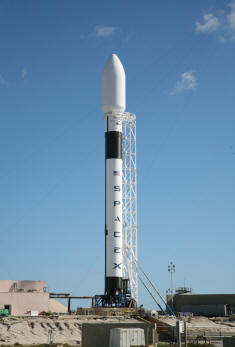
Assume that your rocket is now standing stationery on the launch pad on Earth.
Remember back to high school science where you learned that the Earths gravity accelerates us downward to the surface at about 10 meters per second. (Think of a skydiver falling faster and faster as he approaches the ground).
Now when you consider that as seen in the first thought experiment there is no difference between the laws acting on the accelerating box in space and the stationery box on the Earths surface (under the force of gravity), we can see that there is no difference between the rocket (Second experiment) moving through space and the rocket standing on the launch pad.
Therefore time dilation still exists even when the rocket is stationery on Earth. The force of gravity replaces the forward acceleration of the moving rocket.
Lets now remove the rocket on the launch pad and replace it with something more familiar like a tall building. You are on the ground floor and your twin is on the roof.
Time is travelling faster for him, he is existing and aging faster than you!
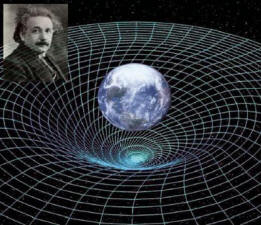
Well done if you have made it this far. If you have understood what you have read then your mind has been opened up to a new way of looking at the world around you.
Time which we all thought to be an absolute universal constant is in fact not constant at all.
